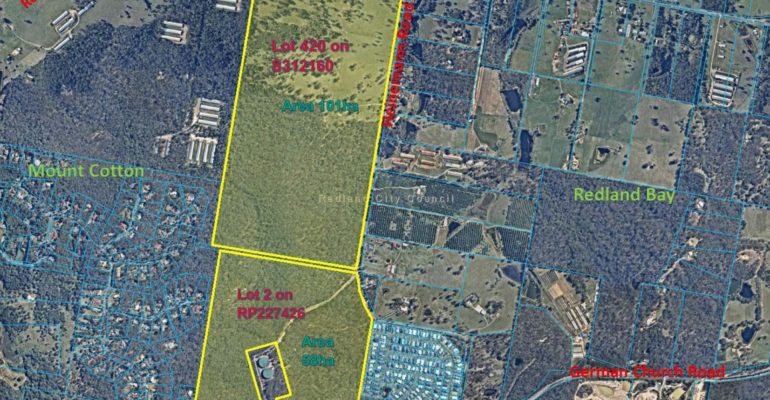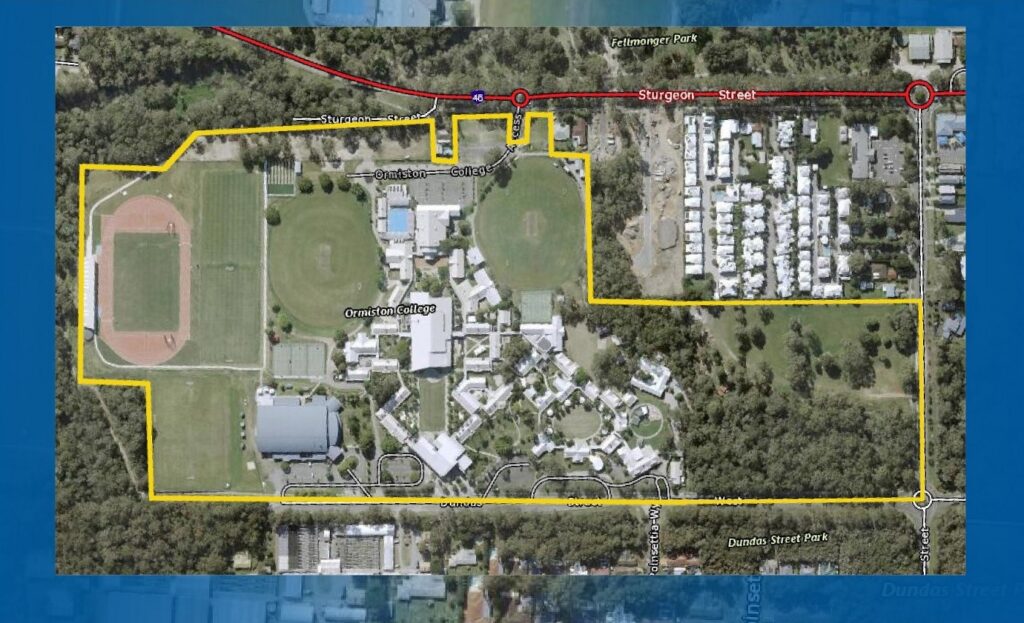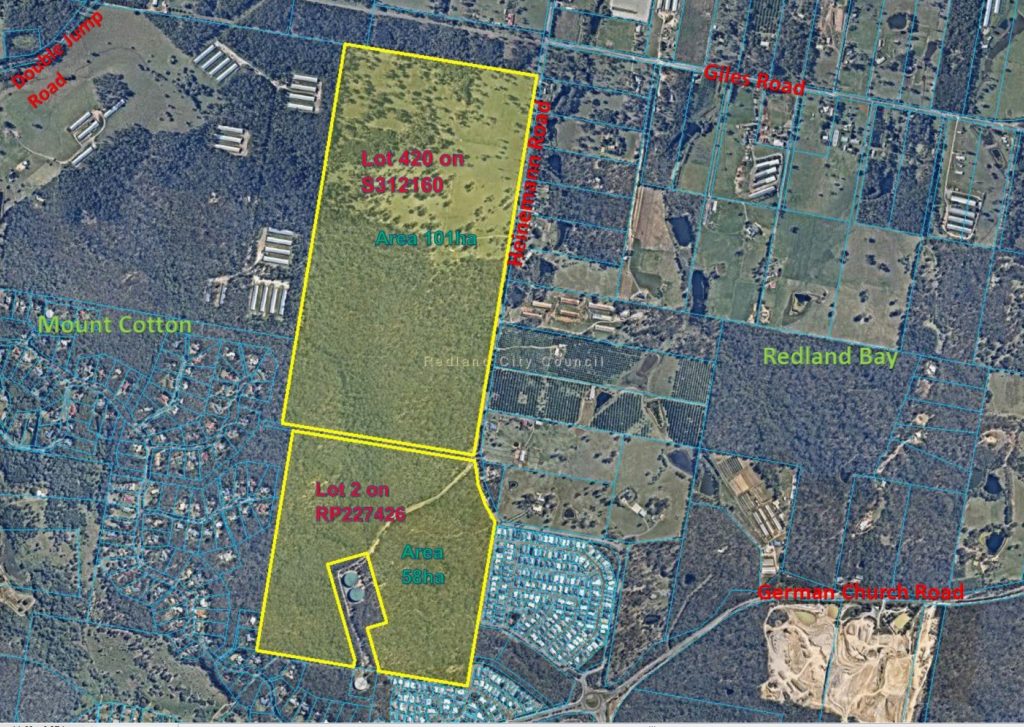
Letters to the Editor – 14 April 2023

Letters this week discuss Council secrecy in major project decision making and the impact on koalas of Ormiston College’s expansion plans.
The third letter examines the morality of Redland City Council’s plan to clear 550 trees at Heinemann Road.
If you want to have your say about any issue of interest to folk in the Redlands, email your letter to theeditor@redlands2030.net
Wanted – less Council secrecy

Listening to the hype from some councillors about proposed projects in Redlands one would think that we were flush with money.
But as it stands, we’re still waiting more than a year after our request for a simple kerbside crossover to enable wheelchairs to access a local park. Undoubtedly there’s lots of other examples.
Instead, we get grandiose plans for the Heinemann Road sports precinct, Birkdale Community Precinct and Toondah Harbour.
The costs to ratepayers of Toondah Harbour development is shrouded in secrecy; the white-water rafting facility at Birkdale has incomplete costings and no business plan; and land purchased for the Heinemann Road Sports Precinct is constrained and appears to have cost blow-outs, even in the early stages.
Candidates in the 2024 Council election who will deliver transparency and not hide behind ‘commercial in confidence’ will be seriously considered at the ballot box.
D.A.H.
Thornlands
Ormiston College and koala trees

A group of us normally meet each week for a coffee and a chat.
Ordinarily, we wouldn’t write something like this, nevertheless, in this instance, we need to do so for our own peace-of-mind.
We’re Ormiston locals and we’re concerned at the approach the Ormiston College seems to be taking to ensure their latest redevelopment project known as the Master Plan comes to fruition: sadly, it could be at the expense of our beloved local Koalas, who are vulnerable, endangered, and importantly, entrusting their future survival to us.
When it comes to wildlife conservation, so much has been done by so many dedicated individuals and businesses in the region.
For 20 years, the Redland City Council’s commitment in this area has been extraordinary and still continues today. We applaud their resolve and it’s easy to see why our eco-friendly suburb has blossomed.
Coastal Koala Watch, where some of us are members, is also a Redlands initiative and according to their database, Ormiston is the number one suburb to see Koalas.
We have so much to be grateful for and so much more to look forward to if we continue to protect our fauna and flora.
Several questions have arisen in our group about Koala priority zones and habitat areas on College grounds in respect to the proposed redevelopment. If the College’s Master Plan is successful and approved in its current form by the Queensland Government, we could see these precious native animals displaced from their habitat if we don’t speak-up.
It would be nice to hear Ormiston College’s perspective on the subject. We’re sure students and parents alike would also appreciate the feedback along with the wider Redlands community.
In principle, we have no issues with the College’s Master Plan, but it can’t displace our endangered Koalas.
There has to be a better option.
Concerned Residents
Ormiston
Save Heinemann Road trees

As I write this letter, I have just heard the news that the Greens have agreed to support federal Labor’s emissions reductions plan aimed at over 200 of Australia’s largest greenhouse gas emitters, in exchange for a hard cap on greenhouse gas emissions.
I will return to this emissions reduction plan at the end of my letter.
In 1968, a Professor of Biology, Garrett Hardin, gave a presidential address to a divisional meeting of the American Association for the Advancement of Science, which formed the basis for an article he then published, The Tragedy of the Commons. In that article, Hardin made the interesting observation when he spoke about “a not generally recognized principle of morality, namely, the morality of an act is a function of the state of the system at the time that it is performed.”
One of the founders of the discipline of ecological economics, Herman Daly, spoke of doing economics in a “full world”. There is a mounting body of evidence that we live in a “full world”. The Sixth Assessment Report (AR6) of the IPCC warns of the risk of neglecting that fact with reference to just one aspect of that “full world”, anthropogenic global warming and associated climate change.
Building on Hardin’s insight, the state of the global system has to be considered when assessing the morality of any action, particularly relating to changes to the environment.. Let me illustrate.
In 1800, when the global population was one billion people, the use of petroleum and natural gas as major energy sources for civilization was still on the far horizon, and coal fired passenger railways and coal fired power stations had not yet been developed, the cutting down of one mature eucalypt would hardly have been considered an immoral act. At that time, it is estimated that the atmospheric carbon dioxide level was 280ppm, and no one had thought about the impact of the build-up of carbon dioxide levels from the large scale burning of fossils fuels on the earth’s climate.
Fast forward to 2023 and the context is vastly different. Many of the global systems are under extreme pressure. Some are simply not coping, for example the natural carbon cycle cannot cope with our pollution from burning of fossil fuels. Our day to day actions have real and obvious impacts of those global systems. Essential eco-system services are at much greater risk in this systems-stressed “full world” populated by eight billion people.
The cutting down of one eucalypt in this “full world” is a very different moral proposition than it was in 1800. Why? Because the world needs as many trees as can possibly be preserved and planted. Because, in addition to supplying oxygen, influencing climate, providing habitat and food for insects, birds and mammals as well as working with fungi and providing other eco-system services, trees are nature’s best carbon capture technology. They sequester and store carbon biologically.
The Federal Labor Government may well address the pollution side of the greenhouse gas emission equation, but any such legislation is being white-anted by millions of individual actions, many by other tiers of government, around the nation. One of the most obvious ones is the unnecessary loss of trees, especially mature trees.
The cutting down of trees, except for safety considerations (for example, a badly rotted or damaged tree) ought now to be considered an act of dubious morality, if not downright immoral. The well being of the planet and, hence, human well-being, are dependent on the retention and planting of as many trees as possible.
So why is the Redland City Council proposing to cut down 550 mature trees at Heinemann Road? In addition to the loss of eco-system services, the Council is intending to use lots of concrete. Each cubic metre of concrete adds another 400 kgs. of carbon dioxide to the atmosphere. Every truck load of concrete means another three tonnes of carbon dioxide pumped into the atmosphere.
So not only are we undermining the Federal Government’s action by cutting down trees, we are compounding that undermining by adding more greenhouse gases to the atmosphere at the same time. A double whammy!
Unfortunately, there does not seem to be any awareness of the IPCC’s concern for the future of the planet in evidence in the Council’s decisions and actions.
But then again, there isn’t much evidence of awareness in the community either, when I look at all the concrete structures that are popping up all over the city, and the clear felling of trees on land being used for residential and other purposes.
D.J.
Cleveland
Previous Letters To The Editor
Here are more letters to the Editor:
Robodebt, One Mile parking, and Mount Cotton Road upgrade in Letters
Redland City Bulletin Closure, White Water Waste And Magical Mangroves
Redlands2030 – 14 April 2023
Please note: Offensive or off-topic comments will be deleted. If offended by any published comment please email thereporter@redlands2030.net